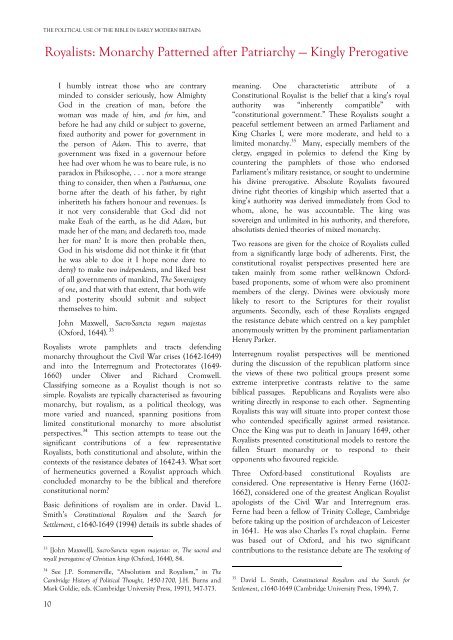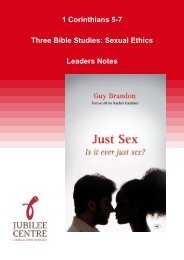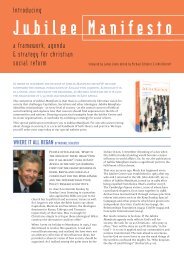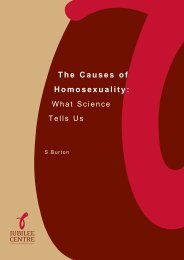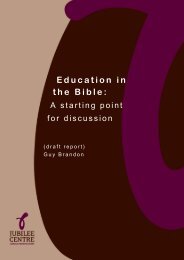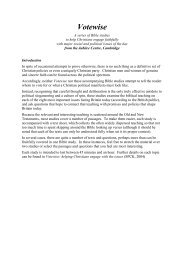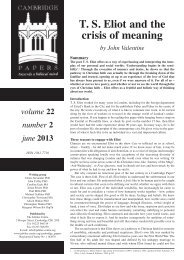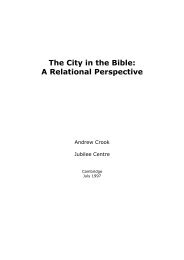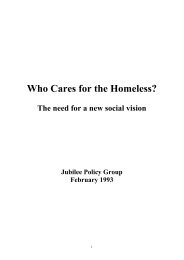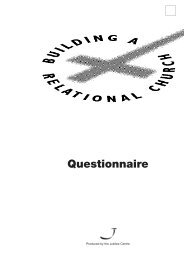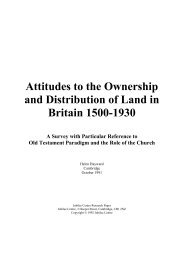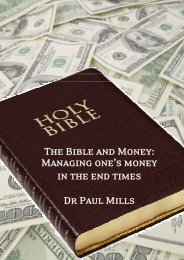Report Template - Jubilee Centre
Report Template - Jubilee Centre
Report Template - Jubilee Centre
You also want an ePaper? Increase the reach of your titles
YUMPU automatically turns print PDFs into web optimized ePapers that Google loves.
THE POLITICAL USE OF THE BIBLE IN EARLY MODERN BRITAIN:<br />
Royalists: Monarchy Patterned after Patriarchy — Kingly Prerogative<br />
I humbly intreat those who are contrary<br />
minded to consider seriously, how Almighty<br />
God in the creation of man, before the<br />
woman was made of him, and for him, and<br />
before he had any child or subject to governe,<br />
fixed authority and power for government in<br />
the person of Adam. This to averre, that<br />
government was fixed in a governour before<br />
hee had over whom he was to beare rule, is no<br />
paradox in Philosophe, . . . nor a more strange<br />
thing to consider, then when a Posthumus, one<br />
borne after the death of his father, by right<br />
inheriteth his fathers honour and revenues. Is<br />
it not very considerable that God did not<br />
make Evah of the earth, as he did Adam, but<br />
made her of the man; and declareth too, made<br />
her for man? It is more then probable then,<br />
God in his wisdome did not thinke it fit (that<br />
he was able to doe it I hope none dare to<br />
deny) to make two independents, and liked best<br />
of all governments of mankind, The Soveraignty<br />
of one, and that with that extent, that both wife<br />
and posterity should submit and subject<br />
themselves to him.<br />
John Maxwell, Sacro-Sancta regum majestas<br />
(Oxford, 1644). 33<br />
Royalists wrote pamphlets and tracts defending<br />
monarchy throughout the Civil War crises (1642-1649)<br />
and into the Interregnum and Protectorates (1649-<br />
1660) under Oliver and Richard Cromwell.<br />
Classifying someone as a Royalist though is not so<br />
simple. Royalists are typically characterised as favouring<br />
monarchy, but royalism, as a political theology, was<br />
more varied and nuanced, spanning positions from<br />
limited constitutional monarchy to more absolutist<br />
perspectives. 34 This section attempts to tease out the<br />
significant contributions of a few representative<br />
Royalists, both constitutional and absolute, within the<br />
contexts of the resistance debates of 1642-43. What sort<br />
of hermeneutics governed a Royalist approach which<br />
concluded monarchy to be the biblical and therefore<br />
constitutional norm?<br />
Basic definitions of royalism are in order. David L.<br />
Smith’s Constitutional Royalism and the Search for<br />
Settlement, c1640-1649 (1994) details its subtle shades of<br />
33<br />
[John Maxwell], Sacro-Sancta regum majestas: or, The sacred and<br />
royall prerogative of Christian kings (Oxford, 1644), 84.<br />
34<br />
See J.P. Sommerville, “Absolutism and Royalism,” in The<br />
Cambridge History of Political Thought, 1450-1700, J.H. Burns and<br />
Mark Goldie, eds. (Cambridge University Press, 1991), 347-373.<br />
meaning. One characteristic attribute of a<br />
Constitutional Royalist is the belief that a king’s royal<br />
authority was “inherently compatible” with<br />
“constitutional government.” These Royalists sought a<br />
peaceful settlement between an armed Parliament and<br />
King Charles I, were more moderate, and held to a<br />
limited monarchy. 35 Many, especially members of the<br />
clergy, engaged in polemics to defend the King by<br />
countering the pamphlets of those who endorsed<br />
Parliament’s military resistance, or sought to undermine<br />
his divine prerogative. Absolute Royalists favoured<br />
divine right theories of kingship which asserted that a<br />
king’s authority was derived immediately from God to<br />
whom, alone, he was accountable. The king was<br />
sovereign and unlimited in his authority, and therefore,<br />
absolutists denied theories of mixed monarchy.<br />
Two reasons are given for the choice of Royalists culled<br />
from a significantly large body of adherents. First, the<br />
constitutional royalist perspectives presented here are<br />
taken mainly from some rather well-known Oxfordbased<br />
proponents, some of whom were also prominent<br />
members of the clergy. Divines were obviously more<br />
likely to resort to the Scriptures for their royalist<br />
arguments. Secondly, each of these Royalists engaged<br />
the resistance debate which centred on a key pamphlet<br />
anonymously written by the prominent parliamentarian<br />
Henry Parker.<br />
Interregnum royalist perspectives will be mentioned<br />
during the discussion of the republican platform since<br />
the views of these two political groups present some<br />
extreme interpretive contrasts relative to the same<br />
biblical passages. Republicans and Royalists were also<br />
writing directly in response to each other. Segmenting<br />
Royalists this way will situate into proper context those<br />
who contended specifically against armed resistance.<br />
Once the King was put to death in January 1649, other<br />
Royalists presented constitutional models to restore the<br />
fallen Stuart monarchy or to respond to their<br />
opponents who favoured regicide.<br />
Three Oxford-based constitutional Royalists are<br />
considered. One representative is Henry Ferne (1602-<br />
1662), considered one of the greatest Anglican Royalist<br />
apologists of the Civil War and Interregnum eras.<br />
Ferne had been a fellow of Trinity College, Cambridge<br />
before taking up the position of archdeacon of Leicester<br />
in 1641. He was also Charles I’s royal chaplain. Ferne<br />
was based out of Oxford, and his two significant<br />
contributions to the resistance debate are The resolving of<br />
35<br />
David L. Smith, Constitutional Royalism and the Search for<br />
Settlement, c1640-1649 (Cambridge University Press, 1994), 7.<br />
10


